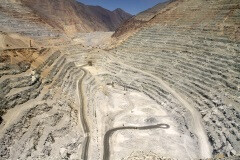Interview with Executive Vice President of Chile’s Foreign Investment Committee, Jorge Pizarro Cristi
With a new President at the helm, Chile's economy is facing several tough challenges. LatAm INVESTOR caught up with the Executive Vice President of Chile’s Foreign Investment Committee, to find out how this would affect investors...

Copper prices have suffered in the past year and, with many analysts negative on China, it seems likely that we will seen a sustained lull in copper prices for the next few years; how will this affect Chile’s economy?
Chile has a good record of dealing with international changes and growth of various markets over different years. We’ve used counter-cyclical policies to accelerate growth when needed so your readers shouldn’t be too worried.

You also need to remember that Chile has been working to diversify markets for its copper. For example, India could help boost copper consumption in the future, which would protect the mining industry from a China slowdown.
What about the impact of President Bachelet’s new reforms on international investors? Will moves such as increasing corporation tax to 25% from 20% hinder incoming investment?
Look, what the country is doing is necessary. We are investing in the education system and heavily investing in human capital. The main resource we have is our people so this isn’t just the responsible thing to do – it is the smart thing to do. Investing in education will make our workforce more competitive and more attractive for foreign direct investment (FDI). I have talked with many international companies that have Chilean investments, or are looking at making some, and they have told me that our spending on our human capital reassures them. They know that it will eventually benefit their long-term investments. Moreover the stats back me up. If you look at the numbers there has been no impact in FDI, it is still following the established trend of steady growth. In fact I think this will help boost FDI. One of the country’s challenges is to create more value and diversify our economy, and our moves in education will help us do this.
A lot of our readers will know about Chile’s mining; can you let us know about other, less-known, sectors that have potential?
There are two main sectors to draw attention to. One is the service sector, which has grown a lot recently. Many of these firms have grown not just in Chile but are investing heavily in Peru or Colombia, so it’s an interesting opportunity. By investing in these firms, British investors won’t just benefit from Chile’s local market but also from the fact that Chilean companies are expanding abroad.

There is also a pretty interesting agenda in energy. Chile needs to boost its generating capacity to keep up with the projected increases in demand. Moreover the country has also committed to reach the challenging goal of making 25% of Chile’s energy matrix come from renewable resources. We have lots of wind, hydro and solar opportunities and now we look set to take advantage.
Some people say that the Pacific Alliance is just a ‘marketing trick’ and that not much is being done to integrate these economies; is that true?
You have to look at Chile’s participation in the Pacific Alliance as part of a broader phase of integration with the global economy that has been going on for the last 30 years. Chile is an extremely open economy and has strong ties with many economies in the world. We have links with Europe, with North America, with Asia and are working on opening ties with more. Integration in that sense is crucial and the Pacific Alliance is just one of the efforts that the country is making to make the economy a ‘port economy’ where you can produce in Chile and reach 85% of the world’s GDP in privileged conditions because of all of our free trade agreements. The Pacific Alliance is a valid effort, we will keep working on it and we will see the results in the medium term, in a couple more years, everyone understands that these efforts, which require co-ordination and co-operation between countries, are a long-term proposition. Chile is keen on strengthening its ties with the Pacific Alliance but also to keep working with Mercosur.
You can read more on Chile in the latest edition of LatAm INVESTOR’s quarterly magazine. To download the e-version for free and sign up to receive subsequent print editions for FREE click here